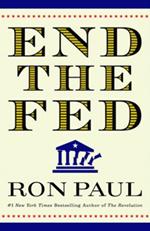Monetary Policy and The State of the Economy hearing before the Committee on Financial Services, U.S. House of Representatives, November 8, 2007
 Representative Paul. Thank you, Mr. Chairman. The best way I could describe the problems that we face here in this country, as well as the problem the Federal Reserve faces, is that we are, indeed, between a rock and a hard place. We have a serious problem that we don’t talk about much, how we got here. We talk about how we’re going to patch it up. The bubble has been burst. We saw what happened after the NASDAQ bubble burst. We don’t ask how it was created, and now we have a housing bubble that’s deflating and spreading. Nobody says, where does it come from? What is the advice that you generally get? That is, inflate the currency. They don’t say inflate the currency; they don’t say debase the currency; they don’t say devalue the currency; they don’t say cheat the people who are safe; they say, lower the interest rates, but they never ask you — and I don’t hear you say too often — the only way I can lower interest rates is, I have to create more money. I have to lower the discount rate; I have to make it generous; I have to increase reserves; I have to lower the interest rate, fix the interest rate, the overnight rate. The only way you can do this is by increasing the money supply. I see this as the problem that we don’t want to talk about. Currently, of course, we can’t follow the money supply with M3, but we can follow one of your statistics, the MZM, the rating caps available, and we see that inflation is alive and well. That money supply figure is going up at about 20 percent, annualized. This just means the dollar gets weaker. Everybody says, well, that’s great, the dollar is weaker and we’re going to have exports. And that is a fallacy. It may be for a month or 2, but it just invites inflation. Unless we get down to the bottom of it and define what inflation is, and not look only at prices — this was taught by the free market economists all through the 20th century. They said, beware, they will increase the money supply, but they will make you concentrate on prices, and we’ll give you CPIs and PPIs and they’ll fudge those figures, and they’ll talk about wage and price controls to solve our problems. And we ignore the fundamental flaw which is, not only have we had a subprime market in housing, but the whole economic system is subprime, and we have artificially low interest rates. It was not under your tenure in office. It has been going on for 10 years or longer. Now we are bearing the fruits of that policy of 1 percent interest rates, overnight rates, and that is not a distortion? Instead of looking at the prices, the consumer prices which nobody in this country really believes, we need to talk about the distortion, the malinvestment, the misdirection, the bad information that has been gotten from artificially low interest rates. In many ways some people refer to you as a price fixer, you know, because you fix interest rates. The market is powerful, and usually overwhelms and does come into play, but when the Fed fixes an interest rate at 1 percent, that is price fixing. At the end of your testimony you suggested that we should address this housing crisis and we should have rules that would address deceptive lending practices. I just think that is not the answer at all. The real deception is when we distort the value of money when we create money out of thin air. We have no savings. Yet there is so-called u2018u2018capital.” There is money available, but it comes from what you have to do when the pressure is put on you. So I think we have to get back to the very fundamentals of where this problem comes from. The bubbles occur when we have this malinvestment and the creation of new money. So my question boils down to this: How in the world can we expect to solve the problems of inflation — that is, the increase in the supply of money — with more inflation?
Representative Paul. Thank you, Mr. Chairman. The best way I could describe the problems that we face here in this country, as well as the problem the Federal Reserve faces, is that we are, indeed, between a rock and a hard place. We have a serious problem that we don’t talk about much, how we got here. We talk about how we’re going to patch it up. The bubble has been burst. We saw what happened after the NASDAQ bubble burst. We don’t ask how it was created, and now we have a housing bubble that’s deflating and spreading. Nobody says, where does it come from? What is the advice that you generally get? That is, inflate the currency. They don’t say inflate the currency; they don’t say debase the currency; they don’t say devalue the currency; they don’t say cheat the people who are safe; they say, lower the interest rates, but they never ask you — and I don’t hear you say too often — the only way I can lower interest rates is, I have to create more money. I have to lower the discount rate; I have to make it generous; I have to increase reserves; I have to lower the interest rate, fix the interest rate, the overnight rate. The only way you can do this is by increasing the money supply. I see this as the problem that we don’t want to talk about. Currently, of course, we can’t follow the money supply with M3, but we can follow one of your statistics, the MZM, the rating caps available, and we see that inflation is alive and well. That money supply figure is going up at about 20 percent, annualized. This just means the dollar gets weaker. Everybody says, well, that’s great, the dollar is weaker and we’re going to have exports. And that is a fallacy. It may be for a month or 2, but it just invites inflation. Unless we get down to the bottom of it and define what inflation is, and not look only at prices — this was taught by the free market economists all through the 20th century. They said, beware, they will increase the money supply, but they will make you concentrate on prices, and we’ll give you CPIs and PPIs and they’ll fudge those figures, and they’ll talk about wage and price controls to solve our problems. And we ignore the fundamental flaw which is, not only have we had a subprime market in housing, but the whole economic system is subprime, and we have artificially low interest rates. It was not under your tenure in office. It has been going on for 10 years or longer. Now we are bearing the fruits of that policy of 1 percent interest rates, overnight rates, and that is not a distortion? Instead of looking at the prices, the consumer prices which nobody in this country really believes, we need to talk about the distortion, the malinvestment, the misdirection, the bad information that has been gotten from artificially low interest rates. In many ways some people refer to you as a price fixer, you know, because you fix interest rates. The market is powerful, and usually overwhelms and does come into play, but when the Fed fixes an interest rate at 1 percent, that is price fixing. At the end of your testimony you suggested that we should address this housing crisis and we should have rules that would address deceptive lending practices. I just think that is not the answer at all. The real deception is when we distort the value of money when we create money out of thin air. We have no savings. Yet there is so-called u2018u2018capital.” There is money available, but it comes from what you have to do when the pressure is put on you. So I think we have to get back to the very fundamentals of where this problem comes from. The bubbles occur when we have this malinvestment and the creation of new money. So my question boils down to this: How in the world can we expect to solve the problems of inflation — that is, the increase in the supply of money — with more inflation?
Chairman Bernanke. Congressman, first as a small technical point on the growth in money, money growth has been pretty moderate over the last 2 years. The decrease in MZM is probably related to the financial turmoil. People have been taking their savings out of risky assets and putting them into the bank, and that makes the money data show faster growth. I am not sure that is indicative of a policy necessarily. What we tried to do is follow the mandate that Congress gave us. The mandate that Congress gave us is to look at employment and inflation as measured by domestic price growth, as I talked about today, and I think you would agree we do see risks to inflation and we are taking those into account and want to make sure that prices remain as stable as possible in the United States.
Representative Paul. How can you do this and pursue this policy you have without further weakening the dollar? There is a dollar crisis out there, and people’s money is being stolen. People who have saved are being robbed. If you have devaluation of the dollar by 10 percent, people are being robbed of 10 percent. But how can you pursue this policy without addressing the subject that somebody is losing their wealth because of a weaker dollar? And it is going to lead to higher interest rates and a weaker economy.
Chairman Bernanke. If somebody has their wealth in dollars and they are going to buy consumer goods in dollars who is a typical American, then the decline in the dollar, the only effect it has on their buying power is it makes imported goods more expensive.
Representative Paul. But not if you’re retired and elderly and you have CDs; their cost of living is going up no matter what your CPI says. Their cost of living is going up. They are hurting. That is why the people in this country are very upset. Thank you.
Dr. Ron Paul is a Republican member of Congress from Texas.











